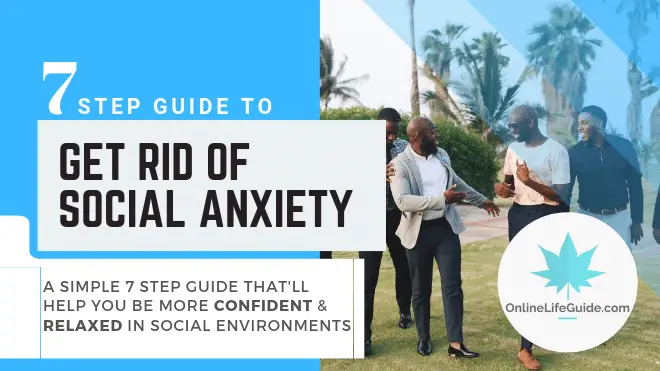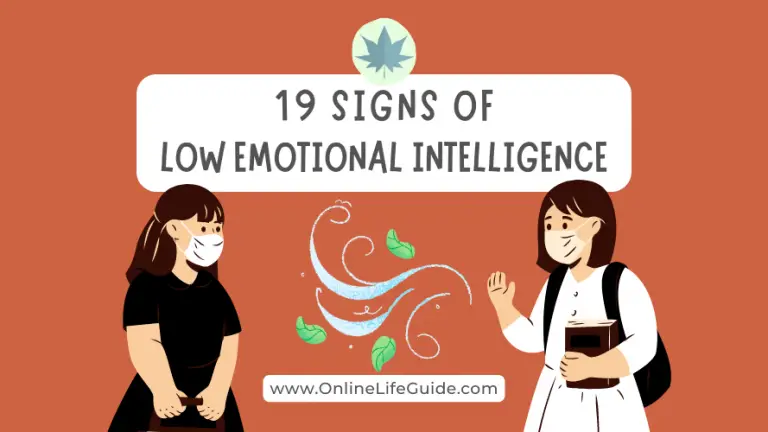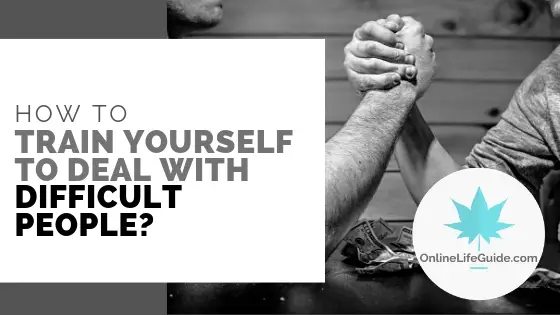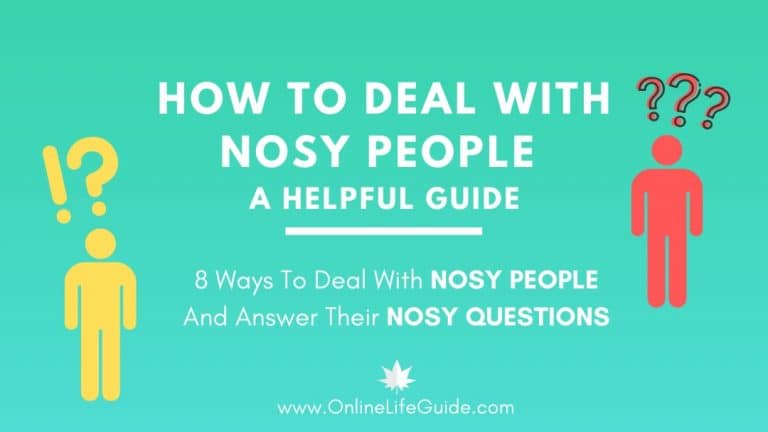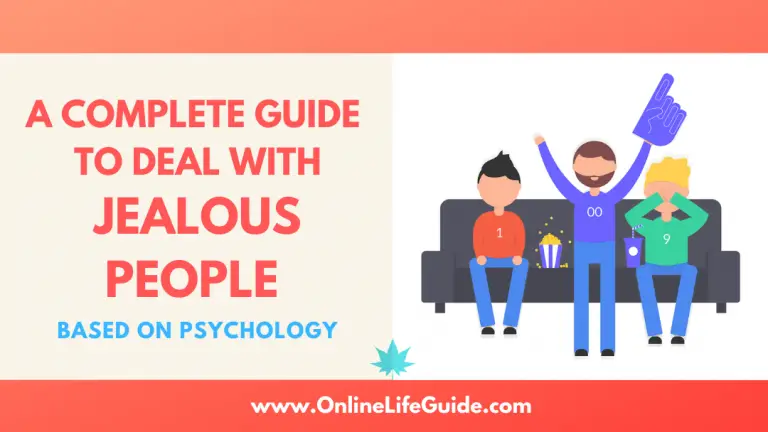20 Signs of High Emotional Intelligence (with Examples) | In-Depth Guide
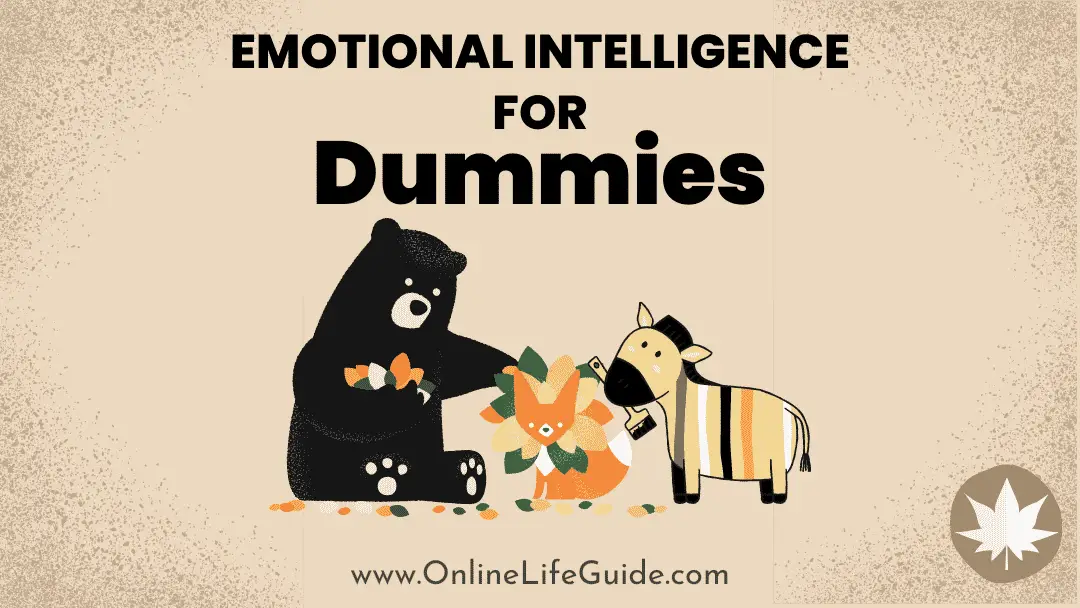
Emotional intelligence, I first came across this word many years ago in my teens when my elder sister bought a book on Emotional Intelligence by Daniel Goleman. This new fancy word caught my attention and I picked up the book to read it only to realize that it was above my level of comprehension at that time.
I couldn’t get past a few pages because of all the technical jargon which I was unable to understand.
Over the years, I gave that book a few more attempts, and eventually understood its essence. It’s a very thorough book through which emotional intelligence emerged as an important topic in the area of personal development, though I wouldn’t recommend that book for beginners.
But don’t worry, I’ve got you covered.
I’m writing this article as an easy-to-understand, relatable yet detailed enough guide to give you a clear understanding of what emotional intelligence practically looks like, and how it applies in your personal and professional life.
Towards the end, I’ll mention some beneficial and reader-friendly resources on how to develop and increase your emotional intelligence if you wish to go deeper into this topic (which every one of us should honestly).
Before we dive into the specific signs, let’s take a quick look at What Emotional Intelligence exactly is, and what high & low emotional intelligence would look like in practical life.
Note that throughout this article I’ll be mentioning “EQ” a lot, which is an abbreviation of Emotional Quotient. It’s a way of measuring/scoring emotional intelligence just like IQ.
What is Emotional Intelligence?
Emotional Intelligence is simply one’s ability to objectively observe their emotions, analyze them, and even shift their emotional state when needed. Not only that, but it’s also the ability to understand other people’s emotions, interpret them correctly and respond to them appropriately, while also being able to empathize with them at the same time.
Emotional Intelligence allows you to observe and be mindful of the non-verbal cues that other people express during communication and tailor your interaction with them accordingly.
It also allows you to process your own emotions and express them in an appropriate manner that is not disempowering for you or for anyone else.
What Does HIGH Emotional Intelligence Look Like
People with high emotional intelligence have first and foremost very rich relationships with people. People love them for their authenticity, sincerity, and selfless contribution. People around them feel heard and respected.
You will find people with high EQ always growing and learning. They are not stagnant, they keep evolving their character and personality by learning from past mistakes. They take feedback from setbacks and uncomfortable interactions, arguments, and fights. They are not perfect but what sets them apart is that they learn.
They are considerate and very mindful of other people’s moods and emotions, respect their feelings and deal with them accordingly.
They don’t make everything about themselves, they love to share their experiences but also are mindful enough to give ample time and space for the other person to express themselves while listening to them attentively taking a genuine interest in what that person has to say.
They are gentle and considerate, yet strong and confident.
People generally have a very good opinion about their character and personality, not just professionally but also among people who are close to them in personal life.
Generally, they have a very proactive and flexible approach towards life and its challenges and have a positive outlook on life which is naturally inspiring and uplifting for the people around them.
What Does LOW Emotional Intelligence Look Like
People with low EQ, on the other hand, often have a rigid and negative outlook on life. They get trapped and stuck easily in momentary emotions and whims.
They often find it hard to realize their own mistakes, learn from setbacks, or take any form of feedback from other people or circumstances. It is much easier for them to put blame on others and play the victim.
They are generally not very flexible or willing to change and have a judgemental approach towards other people. People often get tired and fed up with their non-considerate and self-centered behaviors.
People might appear okay in front of a person with low emotional intelligence out of the fear of their impulsive behavior, but in reality, they don’t actually hold him/her in high regard.
People around them often feel as if they are not respected and valued, and often feel inferior because they are always flexing their superiority over others.
People who know them personally wish that they would listen more, take some feedback, and be more understanding and empathetic.
In short, people with low emotional intelligence (EQ) aren’t very easy-going people to deal with.
Check out all the 19 Signs of Low Emotional Intelligence in this In-Depth Guide.
6 Skills of Emotional Intelligence
To make it easier for us to understand, emotional intelligence can be broken down into 6 key skills:
Self-Awareness
How much understanding do you have of your own emotions and the different states of mind you experience?
Emotional Expression
How well are you at expressing your emotions? Do you usually express your emotions reactively or proactively? How do you usually communicate your emotions and how good are you at communicating them?
Emotional Awareness of Other People
How well do you understand other people’s emotions? Do you come to sudden judgments or do you make efforts to understand their state of mind and empathize with them? Do you successfully pick up on the subtle shifts in people’s emotions?
Emotional self-management
How well do you manage your own emotions? Do your emotions usually drive you or can you shift your state of mind when you need to? Can you utilize the emotional energy and channel it toward something productive or do you allow it to make you unproductive and stay stuck while dwelling on those emotions?
Emotional Management of Others
How well do you handle other people’s emotions? Do you usually allow other people’s emotions to rub off on you and put you in a reactive state while having no control over the situation, or can you effectively influence and possibly shift other people’s emotional states for the better?
Self-Control
How good are you at controlling strong emotions? Do you freeze and shut down in stressful situations or are you able to detach yourself quickly and think clearly about what should do in that situation?
20 Major Signs of Emotional Intelligence
Now that you have an eagle’s eye view of what emotional intelligence (and lack thereof) generally looks like, let’s dive deeper into the signs and characteristics of high emotional intelligence.
Read this open-mindedly and let this be a source of self-reflection.
1. You are Well Aware of Your Thoughts and Emotions
Being aware of your thoughts and emotions is the first and fundamental sign of emotional intelligence.
You are able to detach from your thoughts and observe the thought processes going on in your mind from a neutral standpoint.
Similarly, you are also able to detach emotionally just so you can observe what’s going on inside you.
You can identify what exactly is causing you to feel a certain feeling and even if you don’t know, you curiously seek to study your emotional patterns and notice if they’re benefitting you or harming you.
So many people with low emotional intelligence are solely and blindly driven by emotions without ever realizing what’s going on within themselves.
Their worldview is determined by whatever thoughts and feeling they go through at the given moment, and they base firm beliefs and opinions about the world and life in general, without ever rationally analyzing things.
The ability to reflect and ponder simply escapes them and they have to bear a huge cost for it by taking a hit on the quality of life they are experiencing because of those beliefs and opinions.
As for someone with high emotional intelligence, being aware of your own thought processes and emotional patterns gives you a lot more charge and flexibility over how you experience your life and how you can change what you experience by shifting your thoughts and managing your emotions.
2. You Know Yourself Very Well
As an emotionally intelligent person, you are self-aware, and not just self-aware, you also clearly recognize your deeper character qualities as well as flaws.
You know where exactly your strength lies.
We are not talking about a particular talent or skill, that is quite easy to spot. What we are talking about here is “character traits”.
You recognize which character traits you have that support your growth and make you stand out from the crowd.
It could be your sheer curiosity, self-discipline, truthfulness, honesty, compassion, great work ethic, or just your ability to commit to something.
You are also aware of your personality type but are not bound by it. This means that you realize your psychological patterns and how your mind responds to certain things, but at the same time, you don’t let a label stop you from changing or trying out new things.
You are also well aware of the weaknesses in your character that keep you from operating at your full potential. But being aware of them is not enough, you also continuously keep working on them.
Personal development is a natural part of your life, you are constantly trying to evolve and improve to become a better version of yourself every day in some way.
3. You are Able to Analyze the Situation in the Midst of an Argument
Everyone gets into arguments or fights at some point. If you are emotionally intelligent, you won’t let your emotions get the best of you in such situations.
Even though you might get carried away by your emotion initially, you are quick to compose and ground yourself, and analyze the entire situation from a neutral standpoint, almost from a 3rd person perspective.
Once you analyze it, you then calmly try to de-escalate the argument and be more open and understanding toward the other person.
4. You are Quick to Recognize Your Mistake and Apologize
You don’t let your ego get in the way of your rationality.
You immediately recognize where you did wrong and you are quick to genuinely apologize for your share of mistakes.
5. You are Empathic and Care for People a Lot
Empathy, the ability to understand and share feelings with others is one of the major signs of emotional intelligence.
If someone shares with you their struggles, you feel for them and you have the urge to try to help them according to your own capabilities.
When you see news of some tragedy or disaster, it upsets you, and your keep reflecting on it for the rest of the day.
When you hear the news of innocent people who are suffering because some powerful country decided to oppress and wage war against them, you feel hurt and angry. You wish you could’ve done something to fix things in the world.
You easily shed tears when you see someone suffer, maybe you don’t show it, but inside your heart cries.
6. You are Mindful of the Impact Your Words Have on Other People
Every person has a different way of taking things, different people might associate different meanings to the same words and expressions. You make sure you notice and take feedback on what works with whom.
You notice the subtleties of the other person’s response, expressions, and body language, and you shift your approach toward them accordingly so that they may feel more comfortable and delighted to be in your presence.
This is not to be mistaken for being a “people pleaser”.
People pleasers do it out of their own personal motive, either to become the apple of the eye in a gathering or to escape an uncomfortable situation.
On the other hand, emotionally intelligent people do it so that the other person may feel relaxed and comfortable, and develop good, genuine, and sincere relations with people.
7. You are Flexible in your Approach and Open to Change
Emotional intelligence allows you to step back and analyze what’s working and what’s not.
If something is not working for you, you don’t keep banging your head against the wall. You reflect on your approach and seek more efficient and smarter ways to go about stuff.
If things don’t turn out in life as you expected them to, you pick yourself up and ponder over what you can do to make things better. If it means you need to change something about yourself and your life, you are open to that change.
If something doesn’t work out once, you are flexible enough to try a second approach, if it still doesn’t work out, you take the feedback and look for a third strategy.
You keep trying new strategies until something works out. Having said that, you also realize when to stop, when it’s not worth it anymore to go on with something.
8. You have Sufficiently Decent Social Skills
Whether you are introverted or extroverted, if you have high emotional intelligence, you’ll have relatively decent social skills because of your empathy, flexibility, being open to listening and understanding, and because you’re generally caring and mindful towards others.
You manage your relationships well because you are deeply connected with yourself so you find it easy to connect and understand others.
You don’t necessarily have to be a very outgoing person or a talker for this.
You are good at this because you constantly study people and their behaviors by observing and reflecting upon the interactions you have with them.
This makes you develop a much better understanding of the mindset, emotions, and general psychology of a particular person.
Apart from being aware of your own emotions, you are also mindful of other people’s emotions and thought processes. You are observant of people’s expressions and their states of mind so you tailor your interaction with them accordingly.
9. You are a Trustworthy Person
People can trust you with their secrets and their private matters.
They trust that you’ll give sincere and honest advice, and they might consider you as their well-wisher because you actually are.
You don’t let insecurity or envy get in the way of your relationships with others.
You are the kind of person who wants good for others and have built a reputation among people as genuine and sincere.
10. You Know When to be Assertive
You have developed a sufficient understanding of life and people to know when and with whom to be lenient and assertive.
There is a time and place to be assertive. Someone who is always assertive becomes a controlling person, and the one who is not assertive at all becomes a doormat.
As a person with a high EQ, you realize the balance and implement assertiveness accordingly.
11. You are Well Aware of Your Current Values and Notice Whenever They Change
We all have a specific set of values, whether we are consciously aware of them or not. Our value system determines which things in life we tend to prioritize first and give most of our energy and attention to.
A lot of people struggle in life because they have misaligned values that don’t match their current needs, goals, and circumstances.
If your values are not aligned correctly with your current life circumstances, wants, and desires, your energy and time will be wasted on superficial things that don’t make much of a difference in your life.
Also, our values tend to change over time as we go through different phases and stages of life. Emotional intelligence allows you to keep a check on your values, and consciously adjust them appropriately.
12. You are Good at Decision Making
Since you are well aware of your values and priorities, you are fairly decent at making decisions.
The reason why people often get stuck in making decisions related to life is mostly because of 2 things, Conflicting Emotions and Conflicting Values.
Emotional intelligence enables you to manage your emotions better and align your values & priorities, which in turn makes it easier for you to make life decisions.
You know which things to keep above which. You realize the hierarchy of importance that different things hold in your life.
Now there are indeed times in life when a person has to make really tough decisions, and it’s not always easy and quick to make such decisions. In such circumstances, having a good EQ allows you to think of how to get unstuck and which might be a better route to take.
13. You are NOT Judgemental
As a person with high emotional intelligence, since you are aware of your own imperfections and fallibility and you have an empathetic nature, you often stop yourself from negative assumptions about people.
Even if you find yourself impulsively making harsh judgments about someone, you deliberately try to humble your judgment towards them, since you know that your perception might not be the reality, which takes us to the next trait…
14. You Realize That Your Perception Might not be the Reality
Emotionally intelligent people are also intellectually humble. Intellectual humility is a trait of a high caliber that elevates a person’s character, wisdom, and their understanding of life significantly.
It simply means that you are well aware that the world doesn’t revolve around your own perception and opinions, and that what you perceive might not always be the actual reality.
This allows you the mental flexibility to learn and change your thoughts and opinions to something that is better than how you saw the situation before.
You do not blindly and egotistically stick to your stubborn opinions and worldview. You do not think that your opinions or worldviews are the only right ones and that whoever doesn’t agree with them is wrong.
Instead, you think rationally and neutrally. You easily adapt to your new learnings of life. You are eager to explore more possibilities and open to understanding other people’s worldviews.
15. You are NOT Driven by Impulsiveness and Urges
Since emotionally intelligent people are well aware of themselves, they can spot whenever they are being driven by impulses or having strong urges towards something that might have a negative impact on them or on others.
We are human and we all are driven by impulses and urges from time to time, many of them aren’t even wrong, in fact, some of them might be natural.
A person with a high EQ (Emotional quotient) will be able to eventually recognize which ones are bad, and which ones are natural instincts.
Generally speaking, emotionally intelligent people rationally analyze the spontaneous emotions, impulses, and urges that come up before taking any action in that direction.
16. You are Well Aware of Your Intentions and What’s In Your Heart
Having high EQ makes you a lot more conscious and aware of the connection between your mind, your heart, and your actions.
To put it simply, it allows you to analyze how your thoughts, emotions, and actions are connected.
You are able to notice the driving force and the motivation behind your actions. What thoughts and emotions are driving you to do something? You become well aware of your WHY.
You can monitor your intentions behind certain actions and catch yourself when your intentions behind something are not pure or are very superficial.
You do good because your heart tells you to because you have empathy, care, kindness, and love within you, not to show off, gain fame or attention, or please people.
Whenever you find yourself dwelling on such superficial intentions and motivations, you stop yourself and realign your internal compass.
17. Emotionally Intelligent People are Not Sheeple
People with high emotional intelligence do not easily come under the influence of mindless societal trends, norms, irrational beliefs, status quo, and peer pressure.
Instead of getting carried away by what other people are doing, you are able to observe and reflect over if what others are doing is the right and sensible thing to do, if it’s worth your time and energy, and if it’s really beneficial for you and the people around you.
In short, you are an independent thinker.
18. Your Sense of Worth is Not Dependent Upon Others’ Opinions
When you have a high EQ, you don’t let your self-worth, happiness, and fulfillment be dependent upon other people’s opinions of you.
You cultivate healthy self-love and self-care, and you don’t put superficial prerequisites and conditions on your happiness.
Your sense of worth and deep fulfillment comes from higher values like contribution, servitude, God-consciousness, love, gratitude, kindness, empathy, sharing, and simplicity.
19. You are Able to Move on Quickly after Setbacks or Mistakes
Whenever you make mistakes or get into an argument with someone, or experience a setback or failure, your high self-awareness/emotional awareness doesn’t let you get stuck for too long in such messes of life.
Yes, you take your time to process those down times thoroughly and connect with yourself, that’s very important to you. You reflect and ponder.
Sometimes you might find yourself getting stuck in the emotional patterns of self-pity and blame, but you quickly recognize your thought processes and break out of those disempowering states.
This allows you to forgive other people, and forgive yourself too, so you can move on considerably well while learning important lessons at the same time.
20. You Don’t Suppress Your Emotions
Having a good EQ allows you to observe and process your emotions, instead of suppressing them or avoiding them through various forms of distractions.
People who are not very aware or in touch with their emotions, and who let their emotions be in charge usually try to cope with helplessness or negative emotions by indulging themselves in distractive things which can often be unhealthy.
Things like binge eating, binge-watching, hours upon hours of scrolling through social media, and addictive substances like smoking, tobacco, or alcohol are all examples of subconsciously trying to avoid emotions produced by the not-so-comfortable occurrences of life.
People who have high EQ, don’t take the escape route, they face their emotions and get in touch with them which often allows them to observe and monitor their inner states from a neutral standpoint.
This in turn gives them the ability to eventually take some action to make a shift in their emotional states, and do something about those lingering problems that have subconsciously been haunting them.
How to Improve Emotional Intelligence
Hopefully, now that you have a clear picture of what high emotional intelligence is, and which characteristics you may or may not have yet, you can work towards developing and polishing your emotional intelligence further.
I would highly recommend Travis Bradberry’s book Emotional Intelligence 2.0 which is a very easy-to-read book with sufficient examples to give you a clear picture of different scenarios.
You can get the book here. (It’s an Amazon affiliate link. If you buy the book using this link, I’ll get a small commission at Zero additional cost to you)
Some really good articles on How to increase your Emotional Intelligence are:
19 Signs of Low Emotional Intelligence and How to Improve (by Me)
5 Skills to Help You Develop Emotional Intelligence (by Mark Manson)
How To Improve Emotional Intelligence Through Training (by Positivepsychology.com)
I hope you find a good takeaway from this article, and from the resources mentioned at the end. Now I would like to hear about your experiences in the comments section below 🙂
Talk to you soon!


